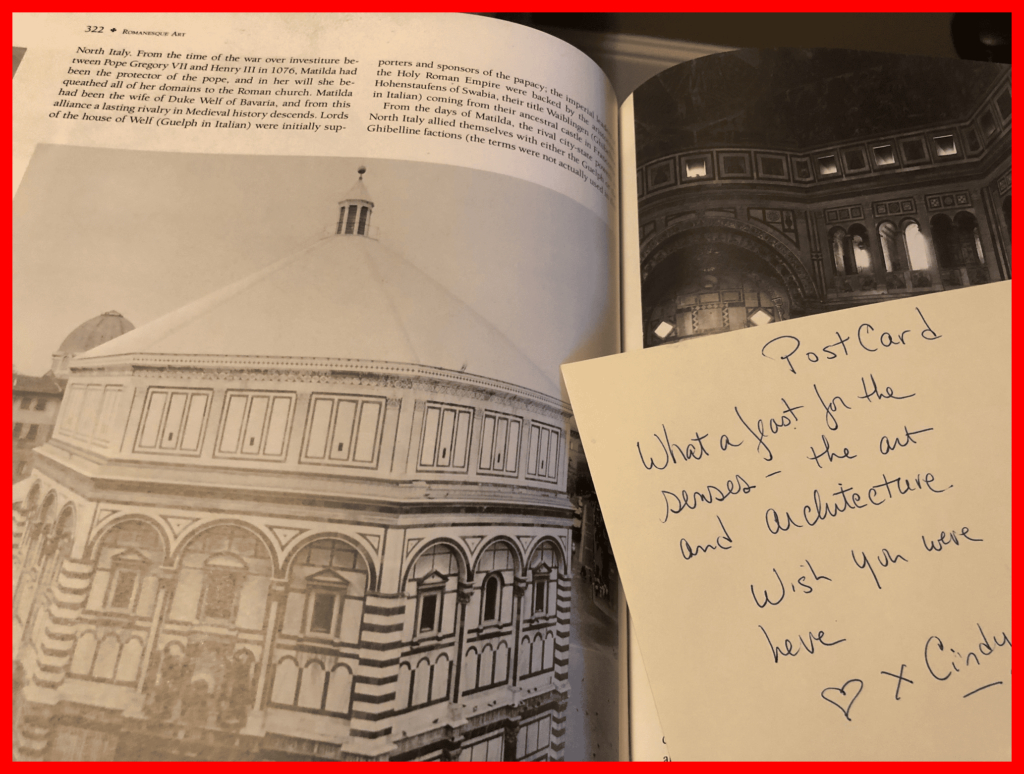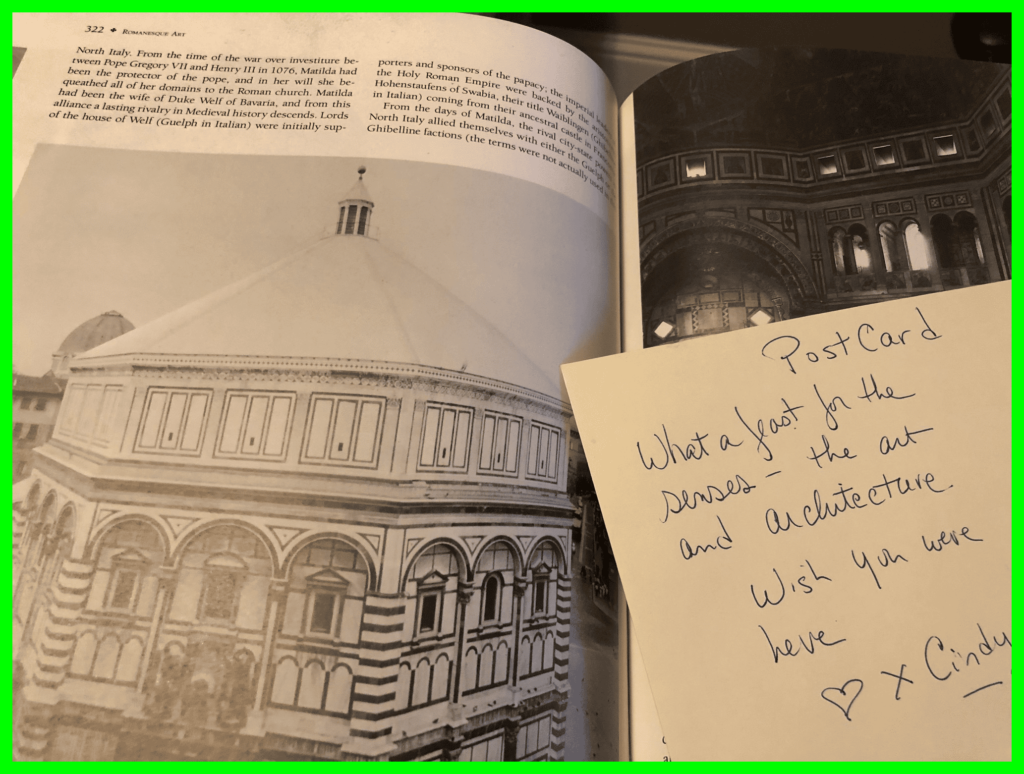A Trail of Friendship
A Christmas Story

Patricia Crisafulli
The door swung open, minus the tinkling brass bell she had expected to hear. Silence numbed the shop interior. When she was feeling like this, some place noisier would be better. In this quiet, she could only hear her thoughts that looped around being alone and lonely at Christmas.
Gwen turned to leave, and a voice called out to her. “Merry Christmas. Come again.”
A gray-haired man in a plaid shirt of muted blues and greens looked up from a tall checkout counter. He smiled at her, or at least his eyes did, over a black mask.
Gwen stepped forward into the shop, immediately immersed in displays of new and used books. The newly released best sellers stood nearest the cash register, their smooth bright covers facing outward and begging to be picked up like puppies at a pet adoption. Signs suspended from the ceiling marked each section: literature, poetry, music, gardening & home décor, history, psychology…. It wasn’t so bad, she decided. The cacophony of books made up the lack of human voices.
At the local history section, Gwen considered buying a book about her new state, but the thought of learning about a place from a book instead of from people kicked up the emptiness she had felt all day. She backed away and nearly collided with the man in plaid. “I’d like to show you something,” he said and beckoned her to follow toward the back of the store.
“Just got these in. You’re too young to remember them, but I thought you might enjoy seeing them.” He held up a bright yellow hardcover with a picture of a young woman holding a lighted candle and climbing a staircase.
Gwen accepted the book when he handed it to her. “Nancy Drew. My mother had a whole set from when she was young. My sister and I used to read them.” She peered in a box and saw a half dozen more.
“Not as valuable as first editions, but someone will enjoy owning them.” His eyes crinkled above the mask. “I’m Rory. I own this shop.”
“Gwen Malthesson.” She pronounced her last name carefully, enunciating the “l” that most people didn’t hear or ignored. Her students did it all the time, calling her Professor Mattison.
“Like Malthus?” Rory asked, and the reference impressed Gwen. Not many people knew about the 19th century economist and his doomsday theory about abundance spawning growth in the world’s population beyond what the planet could possibly support.
“In pronunciation, yes, but I’m more of an optimist.” Gwen laughed at her own comment, and the knot she’d been carrying inside her chest began to loosen.
Rory unpacked books from three cartons, and soon a hodgepodge of hardcovers and softbacks lined the table. He asked a few questions, and she yielded bits of her story: transplanted four months ago to teach women’s studies at the university, swapping the Northeast for a new home in the Northwest. She left out breaking off a two-year relationship that had proved more casual than durable.
Someone came into the store and called out for Rory. He excused himself, and she headed for art & architecture. A title caught her eye: Brunelleschi’s Wonder, and she took down a tall, slim book about Filippo Brunelleschi who, in the 15th century, had achieved the architectural feat of designing the enormous brick dome of the cathedral in Florence. Looking at a photograph on the cover, Gwen thought fondly back to her trip to Italy seven years ago, when she had been in her early thirties and traveling alone in Europe had been an adventure.
She headed to the checkout, where Rory was talking to a woman who turned out to be his wife, Millie. After pleasantries all around, and now feeling much better than when she had come in, Gwen paid with cash and left.

That evening, Gwen sat in the living room of her rented condo, grading a stack of final projects. The microwave beeped, and she put her work aside. As the gooey combo of rice and vegetables in a brown sauce cooled, she picked up Brunelleschi’s Wonder. Turning the glossy pages, she touched a firmer texture and extracted a postcard with a picture of Florence’s massive cathedral. Then she turned it over.
This place is amazing—the food, the wine, the architecture. Maybe I’ll fall in love with a Medici. But all the interesting ones are 700 years old. Miss you so much! Love, Cindy.
The postcard had been addressed to Beth Amberts in a town Gwen had never heard of, but a quick Google search on her phone revealed it was only about 20 miles away. Tipping the smudged postcard toward the light, Gwen read the date—1971.
Turning more pages, Gwen found another postcard—this one of Michelangelo’s David cropped strategically at the navel. Holding the book by the spine, Gwen shook it, and two more postcards slipped to the floor. All of them of Florence, all from Cindy to Beth, all of them describing a young woman’s adventure in Florence, and all of them ending with the line “miss you so much.”
Gwen dumped the microwaved food, now cold and gelatinous, into the trash and foraged for cheese and baby carrots while she dialed her sister. Maeve answered the phone with a hint of concern that made Gwen regret calling so late. “Sorry—I’m having time zone amnesia. I keep forgetting you’re three hours ahead of me,” Gwen joked. “I’m calling for no reason. Let’s talk tomorrow.”
“It’s fine. We’re just watching a movie—some action thing. What’s up?”
Gwen told her sister about buying the book and finding the postcards. As they spoke, Gwen typed “Beth Amberts” into a Google search on her laptop but came up with nothing. “Well, Beth doesn’t live around here anymore, and I don’t know Cindy’s last name.”
“You doing okay?” Maeve asked. “I wish you’d come with us.”
“Too far, too expensive—but thank you.” She’d never intrude on her sister’s ski vacation with her husband and children. “I’ll be fine. Really.”
Gwen returned to“The Book Nook” the next day, bringing Brunelleschi’s Wonder and the postcards with her, but Rory had neither recollection nor record of Amberts in his files.
She examined a postcard of the Ponte Vecchio, Florence’s most famous bridge, but the messages intrigued her most. “They’re so personal—you can feel the connection between these two women. And Beth saved them for 50 years.”
“You going to find out who they were?” Rory asked.
Gwen moved her head slightly, then nodded in earnest. Having this little project appealed to the researcher in her, and with the semester finishing in a few days she’d have more time—and nothing else to do.

Ten days later, Gwen followed the instructions on her GPS: taking the highway north, then exiting on a secondary road where gas stations and fast-food outlets clustered near the interchange. A mile or so later, signs of civilization thinned, and Gwen drove through a swath of national forest. Another town appeared with modest houses spaced far apart. The GPS alerted her to a right turn coming up, followed by a left a half-mile later. Gwen glanced at the phone battery: using Google Maps had eaten half the charge.
Pulling onto the shoulder, she rummaged in the glove compartment and the storage area beneath the armrest between the front seats. No charger. Google Maps showed four minutes to her destination. Gwen pulled back on the road and kept going.
A white clapboard farmhouse stood back from the road, surrounded by an orchard of bare trees. Christmas lights dangled from the roofline, and an inflatable Santa bobbed in the breeze by the front porch. She pulled into the driveway, and immediately two dogs kicked up a chorus of barking, but their wagging tails assured her she wouldn’t be torn to pieces. Gwen pulled the handle, and the car door swung open an inch. A dog’s nose intruded.
“He’s harmless, although you might get licked to death.” A woman who appeared to be about Gwen’s age called from the front porch. “You lost?”
“Not yet,” Gwen grinned. “But if my phone goes out, I will be.”
The woman called to both dogs, and they obeyed. Gwen got out of the car and brought Brunelleschi’s Wonder with her.
They stood outside for the first five minutes, as Gwen described the book and the postcards that had been mailed to this address. The woman, who’d introduced herself as Tyra, explained that she and her husband had bought the farm from the Amberts about five years ago.
“But not Beth,” Tyra added quickly. “Roger Amberts—probably late 60s then. Maybe her brother? This was a family farm for three generations.”
Gwen looked out over the neat rows of trees. “What do you grow?”
“Hazelnuts.” Tyra pulled a sweater around her. “Come in for coffee—if you don’t mind kids and dogs and a mess.”
In the kitchen, their conversation transitioned to what had brought Tyra and her husband to the area—they wanted land and a farm of their own—and Gwen’s relocation a few months ago to teach at the university. After an hour, Gwen brought her coffee mug to the sink. “I’ll let you get back to your family.” She pulled her phone off the charger Tyra had loaned her. “And thank you for this.”
Tyra stood, and her three-year-old immediately wound around her knees. “So we have this party every year on Christmas Day. It’s super casual. People come over around three or four. Dave is going to roast a pig this year. We get quite a crowd. You should come.”
As Gwen composed the politest way to decline, Tyra begged her not to say no. “When Dave and I moved here, we barely knew anyone other than the realtor who had sold us the place,” Tyra went on. “So we started throwing parties a few times a year. It’s really fun and better than sitting by yourself on Christmas.”
Gwen thought of how Maeve would be happy to hear she had plans for Christmas. “Okay, I’ll let you know. But I’ll try.”
“No need—just show up. We cook for an army. You’ll see.”
When December 24th arrived, two movies and an afternoon nap made a dent in the day. By early evening, Gwen had to escape the four walls and drove to a mall before the stores closed. In the grocery aisles, she cruised the prepared foods and decided on grilled salmon with dill and a Mediterranean salad for dinner. On the way to the checkout, she selected a wedge of camembert and a small wheel of brie. And a gift bag.

Not wanting to get blocked in if she decided to leave early, Gwen parked her car at the shoulder and walked down the long driveway. The dogs greeted her with wagging tails and a couple of barks. A man opened the door, introduced himself as Dave, and motioned toward the kitchen where Gwen could find Tyra.
She bristled at the thought of gender stereotypes: women in the kitchen, men being served, then quickly dispelled that notion as Tyra worked side-by-side with her father at the stove. Tyra hugged her and introduced family members who had come just a couple of days before.
“What can I do?” Gwen asked and immediately got an assignment to help set up chairs under the huge tent in the backyard where torchieres blasted their warmth between long tables.
More food than she’d eaten in a year, more people than she’d met since moving, and more conversations than she could keep track of filled the late afternoon and brought her well into the evening. After helping to clear tables and stack chairs, Gwen decided to leave, until Tyra brought out her guitar, and four other musicians dragged over stools. She sat back down.
A man in a heavy sweater sat down next to her and introduced himself as Thad with a last name that Gwen didn’t catch over the music and clapping. “I heard about your postcards,” he said in her ear. “Beth Amberts was my aunt.”
A rush of recognition gripped Gwen, then she registered the past tense verb. “She’s—?”
“Beth died a few years ago. She was married to my father’s brother. Nice lady.”
“Do you know who Cindy is?” Gwen asked.
Thad shook his head. “But I bet my Dad will. I’m going to call him tomorrow.”
Thad’s wife came over, and the three of them talked and laughed until the evening waned into night, and Gwen worried about driving home so late. Tyra told her she should stay, and when the party broke up well after midnight, Gwen curled up on an air mattress in an alcove that held a computer and a narrow bookshelf and slept until sunlight and the smell of coffee roused her.
Her hair mussed and her mouth tasting stale, Gwen went off in search of a glass of water and the bathroom. Tyra appeared a moment later in pajamas and a robe, and Gwen handed her a mug of coffee.
“I thought for sure someone would have known Beth and Cindy,” Tyra said. “But we’re not going to give up. There are plenty of people in their 70s around here who could have known them.”
Gwen’s smile broadened. By following the trail of friendship left 50 years ago, she had found a friend. She looked around the kitchen, now swarming with people who started making breakfast. How quickly her world had changed from empty to full. Someone put on Christmas music, someone else started to sing, and, for the first time in so many months, Gwen felt at home.


